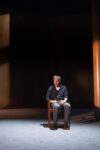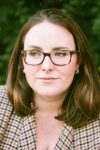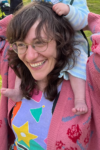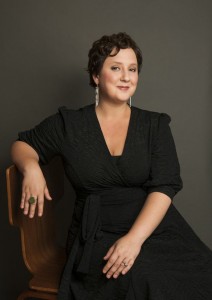
Julia Fierro — photo by Natalie Brasington
Through Writing Workshops Los Angeles and The Sackett Street Writers’ Workshop, both Edan Lepucki and Julia Fierro have separately fostered not-so-small writing communities within America’s two largest metropolises, where the reigning writing asylums are a) prohibitively expensive and b) prohibitively exclusive MFA programs. In my own circuitous attempt to be a writer, I’ve been a transient member of both Lepucki and Fierro’s communities. When I found out they were releasing debut novels around the same time (Edan Lepucki’s California is out July 8, and Julia Fierro’s Cutting Teeth was released earlier this summer), and that both of these novels took vastly different approaches to the two pertinent subjects in the author’s lives — community and parenting, as well as a wild card: apocalypse — I decided to do a joint interview.
California, set a little later this century in the withering eponymous state, follows a pregnant couple, Frida and Cal, from isolation to forced communitarianism in the midst of a slow apocalypse — an environmental and societal deterioration catalyzed by the anxiety-inducing trends in contemporary American existence. Similarly, in Cutting Teeth, when OCD-plagued Brooklyn mommy Nicole invites her playgroup to a beachside house on Long Island for the weekend, the gesture seems totally innocuous. But it turns out it’s an attempt to seek shelter from a “Web bot” apocalypse she read about on a parenting website. Through real and illusory ends-of-days, these stories use confined communities and high stakes to magnify the animalistic love and paranoia implicit in the act of parenting.
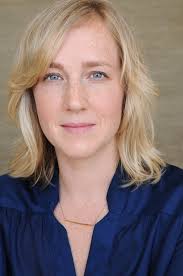
Edan Lepucki — photo by Bader Howar
With Edan currently living in San Francisco and Julia living in Brooklyn, I “sat down” with the two Iowa grads via Skype. The glitchy sounds coming from Edan’s dysfunctional WiFi signal and the interjections of Julia’s children seemed to have been lifted directly from each of their novels. Julia’s book had just been released, and Edan’s had just received the prestigious “Colbert bump” the evening prior. Both had reason to be quite excited.
Moze Halperin: The two of you have fostered these writing communities — with Sackett Street and Writing Workshops L.A. — within your likewise large cities. Has having so many people who’ve studied under you helped spread the word?
Edan Lepucki: Maybe there’s word of mouth today because of Stephen Colbert. I think what has been really meaningful to me and to students that I’ve worked with is that I’ve worked with a lot of them for many years, on their books and stories, and if they know me, I’m pretty open about my rejections. Hopefully I’ve helped champion people — to be like, “don’t-give-up-I’m-not-giving-up!” When I sold my book I got to email my novel to students and their reactions were so excited. One person was like, “I’m crying right now.” And I just felt like saying, “See you guys? I did it. It took me so many years, and you guys all have these books that are in various stages of revision. You all need to finish them, and I’m going to try my best to hook you up with agents that I know.” Because I want them to have that feeling. Like Julia said [before the interview started], you just want your book published. For me, it was that moment and the moment when my family read my book, those were the most meaningful for me. And obviously having strangers read your book is an exhilarating experience.
But you don’t get to experience their experience, except through reviews.
Julia Fierro: They’ll email you, sometimes, which is amazing. When you get a random email from a stranger whose just read your book, and they’ve loved it, and they’re just emailing you to tell you that.
That doesn’t seem like an invasion?
EL: I guess if someone emailed me to say, “You suck.”
JF: I haven’t gotten that yet, so…
EL: If you and I really hit it big, then we will get those emails.
JF: [Her daughter appears] She thinks she’s famous now because she was on the HuffPo live interview.
[Her daughter undermines this claim, urging, “I don’t think I’m famous!”]
JF: It was an essay about her, and that has gone viral. I’ve been getting a lot of emails about that, so I’ve been getting some negative feedback. But I agree with what Edan was saying, I also am obsessively honest with the Sackett Street writers. I didn’t write for 6 to 7 years because I really suffered a big loss in confidence when my first book didn’t sell right out of Iowa, and then I was teaching so much to get by that I just didn’t have time to write, and then I had children, so I was honest with the Sackett writers when I returned to writing. At my launch party a couple of weeks ago, where the support was so incredible — there were hundreds of Sackett writers there — it was just amazing, and I was honest about how long I’d taken a break from writing, and how shocked I was that I was able to return. I really wouldn’t have been able to if it wasn’t for the kind of confidence I learned when teaching novelists. Watching them persevere through years and years —
[Julia’s daughter is puzzled by the image of herself on Skype; she worries, “Mommy I have a tiny head —”]
JF: You have a tiny head, it’s true. But that’s how it is. You write to write, and if you don’t get published, you keep writing. That wasn’t something I necessarily learned in my MFA program, it was something I learned through teaching, and being inspired, because like Edan, I’ve worked with writers for years and watched them finish whole drafts of novels. That has been so incredible, and inspiring in a more realistic way. I personally preferred doing the favors than asking for them. I had been teaching at Sackett for 10 years — and so many of the Sackett instructors and many Sackett writers had been published by major publishers. SO when it was finally time to email some people and be like, “Hey, can you connect me to your agent?” they were like, “YES.” I was so shocked.
[Julia Fierro’s son interjects, “Mommy —”]
JF: Hold on. When my book went out to editors, I did think the platform — I didn’t fully realize what that meant and I’m still not exactly sure — of all the Sackett writers helped a little. Sorry, I have to log into Netflix so the children can watch Netflix. Today is Brooklyn/Queens day, which is not a holiday, but there’s no school.
[Her son exclaims, “I lost a tooth!”]
JF: If you can’t play Netflix, you’re going to have to find a game. What were we talking about? The reason I can write now is that a couple of years ago Sackett Street began to make enough money to enable me to pay for a babysitter so I can have time to write. Tweleve years ago I put an ad in Craigslist, not thinking that it would become a business. I was looking — and I’m writing an essay about this for Poets and Writers — for a haven. I was looking for a place where I could talk about writing outside of the literary scene. I was feeling so uncool because my book hadn’t been published. Perhaps because I said in my Craigslist post, “Iowa grad,” somewhat advanced writers migrated.
I like that word that you used — haven. Because these communities you’ve created are havens within very expansive cities. I feel like Julia, you seem to self-identify as a Brooklyn writer, in so much as the place you teach and write comes through in your writing, and Edan, you seem very much like an L.A. writer. Everyone from both of your novels is from those places. I’m curious if through your classes you’ve gotten a sense of a community voice, and whether that made its way into your novels, either in a character voice or an authorial voice. Is there a way to define the voices of the places you’re both writing from?
JF: When I walk down the street, I see Sackett writers. When I go to the Writers Space, there’s cubicles filled with Sackett writers and Sackett instructors. It’s really incredible to go to a literary event. It makes you feel very special and safe, and it’s my community. I’d started Sackett Street before my children were born, then I was running it full time, raising them from home because I wasn’t making enough to pay a babysitter. So I always had that identity as a mother, but also Sackett Street director, writer, even if I wasn’t writing, and teacher. What happened was that I accidentally wrote this book [Cutting Teeth] about parenting, which I didn’t really intend to do, but it was just the filter through which I was writing about relationships, and that was the phase I’d just come out of. The Sackett writers are much younger than a lot of parent-aged people in New York. So I worried a little bit when I realized it was a book that could be called “About Parenting.” I was like, “Oh god, the Sackett writers are going to hate this.” But it turns out it has been embraced by a lot of literary writers and bloggers, so that’s been reassuring. It’s been complex writing a book on a topic that’s marketed so much about being about that topic. Also Brooklyn is very specific. I don’t know that much about L.A., but I imagine that in many American cities, the kind of urban parenting perspective you’re going to have differs from a small town in Iowa. So I was going to write from that perspective. I even toned it down, because I wanted it to appeal to all different kinds of readers.
EL: The fact that you wrote about parenting means your book can appeal to so many people. Because in the end, the Sackett community is small compared to the community of readers around the world. Not that you were like, “And now I’m going to write the most marketable book ever!” But I feel that if you did write a book that was “Brooklyn writer-y,” it’d be much less appealing to the general population.
JF: It’s also not who I am, even though I run Sackett Street, which is a very literary group. They’re so intellectual and literary, but my taste is probably a little more flexible.
EL: That’s very good. That’s the lamest answer I just had. “Very good, Julia.” I was going to say that my actual book and the tone or the style was not necessarily inspired by my teaching at all. But I feel like I don’t read that many books about L.A. or California. It is obviously a popular place to write about, but I didn’t realize the extent of L.A. in writing until I started teaching. I would say half of the class seems to be writing something about L.A. — they’re just basing their work off the city where they live. So it wasn’t like it changed what I was writing, but it was like, “Hey, there are all of these readers and writers interested in this place.” I don’t see it all the time. You see Iowa towns a lot less than you see L.A. in fiction, I understand. But that was kind of lovely, to see how big of a pull the city had as a setting on the students. And unlike Sackett Street in Brooklyn, it’s not like you see people from your program over and over again all the time. I don’t see Writing Workshops L.A. people. I’m not living in LA, but when I did live there, I wasn’t running into them on the streets. It felt much more like my classes were where I got the community I really longed for, and that I was writing in obscurity all the other times — which was actually a terrific feeling. At night I could sit down with my students and wine and talk about novel writing. Reading five complete novel drafts in a class is a way to learn how to write novels. You see the mistakes people make, you see where the jewels are. And learning how to talk about a novel when it’s not done without killing it is a real skill. It helped me to say, “this is not working, but it’s not going to stop me, and this is how I’m going to fix it.”
In both of your books, you bring a lot of people from these specific places into confined spaces where all their social tendencies and idiosyncrasies are amplified until they kind of go crazy; despite their being rooted in the social mores (or the destruction of the social mores) of these places, there is this pre-social, animalistic desire to procreate that pervades both of your novels. How did parenthood end up truly at the core of your novels?
JF: I’ve read Edan’s novel and I love it so much. I love reading about ordinary life in extraordinary situations. And even though Cutting Teeth is somewhat realism, I wanted to create this hyperreal situation in which all these people were stuffed in this one house, and all these conflicts were escalating. I had a reading at Politics & Prose last weekend and someone asked, “So, is this satire?” I responded, “Oh God. Weeell, when I was writing it, no.” Because I was really feeling, genuinely, what the characters were feeling. I can look at it and say that there is social commentary, but then there are the moments when every parent feels like they’re in some kind of satirical novel or hyperreal situation. It’s like in the first chapter when Nicole has a panic attack in a playground, and nothing bad is actually happening. I think that as fiction writers, we’re examining life under a magnifying glass, and we try to do it in this way that balances the readers’ experience so they can still — [ baby cries] — recognize themselves — [cries again]. You guys, I was about to say something really brilliant! It’s gone! I’ve been so bad — I haven’t even fed them lunch yet because I had this HuffPo thing.
EL: Thank you Julia, I loved your book as well, as you know.
JF: We galley-swapped.
EL: Our books have interesting things in common. They both talk about people in confined situations dealing with interpersonal issues.
One is a real apocalypse and one is a pseudo-apocalypse within this anxious character’s head.
EL: That’s hilarious. So yeah, I think there are some parallels. It’s funny, because I started the book when I wasn’t even pregnant. I wrote some of the book before I got pregnant, some of it while I was pregnant, and some of it after I had a kid. So I feel like I became a mother as I was writing the book, which was fascinating. Some people ask me if it’s a book about parenthood after I’d had a child — if I was coming at it from that perspective — but it wasn’t. There is the line near the end where one adult character thinks about how another offered them safety and comfort — about how every parent would want to be tucked in every night and given a cookie, basically. And that was a feeling I had when I had my baby, which was this desire to NOT take care of another person, but to be taken care of. So I brought that into the book, and that informed the book, to some extent.
And I think you both paint parenting as at once a very generous but very narcissistic thing.
EL: Totally. And I think that’s especially true now in the era of social media. I’m included in this — and this is going back to Julia’s essay — but loving to post photos of your child, and racking up the “Likes.” And what is that itching in us? It’s a really fascinating topic to me.
It’s the next closest thing to posting a picture of yourself, but without directly doing it.
EL: Yes. And I think my desire to stay away from social media when I’m with my son — so that he doesn’t see me on it all the time — is really important. There is also that day-to-day act of selflessness of having a child, particularly as a writer, that I find I struggle with. I love to work and I love to write, and having a child is taking that time away from me. And yet I’m doing something really important, which is raising another human being, and he is a terrific human being. I’m always feeling those two struggles. What’s interesting is I wrote this book about two people on the verge of having a child, and I think probably my next book will be more directly about parenting, à la Julia, because that’s sort of on my mind.
And your novella, If You’re Not Yet Like Me, was about this woman talking to her unborn child.
EL: I think I’m obsessed!
Both of your books are within an apocalypse or a pseudo-apocalypse. For Julia, there’s Nicole’s constantly terrified inner monologue.
EL: What’s that thing called that she thinks is going to happen?
JF: The web bots.
The web bots!
JF: It’s a real thing! It’s plucked from real life!
Well it seems like Nicole has pure OCD, right? Where it’s not so much that any one obsession matters, it’s just this internal void that needs to be filled with an obsession.
JF: I mainly have only the obsessing without the compulsions. My compulsion is to talk about it, or to write about it. Nicole was so important to me because I wanted to show her respect. I wanted to show that fine balance where she’s stuck in this obsession, yet she’s also aware of how ridiculous it is, because that creates that self-loathing that almost feels just as bad as the fear. I really tried so hard to figure out how to do that — and it was a really fun challenge as a writer. It was also meaningful to me because I’m obsessive compulsive. When my editor read the book and we had our first call to figure out if she was going to buy it I asked her who her favorite character was, and she said, Nicole. She can rub some people the wrong way — to some people, she’s just crazy.
I feel like the reader is both immersed in her world and understands it, but then can pull out of it and think it’s kind of funny in its intricacy. There are both of those sides. Between this fabricated apocalypse and the real one in Edan’s book — what is it about parenthood that made you want to set parenthood in an apocalypse?
EL: There’s something about parenthood as a dividing line in yourself — a before and after — before you’re a parent and after you’re a parent. I don’t know about you Julia, but as a writer my whole identity was so much about writing and reading and being a writer and teacher, that when I became a parent, it was a role that felt very foreign to me. And just so strange really. I never thought of myself as a mother, and now I have to absorb my identity into all these other parts of my identity. This is sort of after the fact — in my book, the past is unreachable. Their lives are entirely different than they used to be — whole cities are ruined, family members are gone, so they’re constantly thinking about loss. And not that parenthood is a loss, because obviously it’s a gain. It’s not an apocalypse, not even a personal apocalypse, but I do think there’s something in that shift — in the before and after — that I’m interested in.
JF: I was playing with the apocalyptic implication throughout the book, because I feel like parenting is one of those few experiences where beforehand, you really can’t imagine what your life is going to be like. And people spend so much time trying, but you don’t know what kind of child you’re going to have, what their personality is going to be like, or what you’re going to be like as a parent. But I think what Edan’s saying is so true. In a figurative way, it is like an end of days, and I also wanted to use that hyperreal obsession with the apocalypse to show the very fearful thread that runs through contemporary parenting, which is due to a lot of things, like having too much information on hand, too many extreme parenting philosophies, not enough support. Especially if you’re raising your kid in a city, most likely you went to that city because you left your hometown — and we have no support other than babysitters. So I wanted it to act as an allegory for a certain kind of anxious parenting effect. It was really fun to write about, too.
EL: I’m the kind of person who, if the apocalypse happens, I’m not prepared. I’m a pretty anxious person in some ways, but not an anxious parent. I don’t know how that happened. But at the same time I sort of reveled in writing this horrible end of the world. I really enjoyed imagining the devastation.
I can imagine, especially when you were talking about landmarks in L.A. The poop in the Silverlake Reservoir or the sludge-filled fountain of The Grove.
JF: It’s the point where so much is at stake — I want to read books where there is the most at stake. It’s the ultimate escape. And it also causes this weird reassurance. It’s not surprising that we both have that theme — obviously Edan’s is much more concrete. With what’s going on in the world, and at the end of any century, there’s this obsession with the end of days. When you look at the end of the 1800’s, there’s so many of those religious cults — it’s really so much a part of our contemporary sensitivity, with climate change and 9/11. There’s a reason there are so many movies about apocalyptic happenings. It’s not that far from the truth, sadly.
EL: One thing I wanted to do was make an apocalypse that wasn’t that extreme, that would just continue slowly because I think that’s scarier.
Finally, I wanted to ask what role race plays in your books. Edan, California has August, who’s described as possibly being “the last black person in this area,” and so he’s othered in that sense. And Julia, in your book there’s the nanny, Tenzen, who’s likewise a foreign, othered character. Neither is at all tokenistic, but I’m wondering what you wanted to say with these characters.
EL: When I first started writing, August showed up, and he’s black. And I was thinking about a few things — there’s that trope in horror movies where there’s one black guy and he always dies first. So I thought, “Why don’t I turn that on its head and make note of the fact that he’s the only black person?” Because oftentimes in a book or movie, there will be one person of color, but it’s never mentioned that they’re the person of color. It’s invisible, and that would not happen in life. In California, in L.A., a lot of the black population has decreased, as they’ve been pushed out of lower income areas. Larger black communities are in Palmdale or Lancaster. I was thinking just in terms of the world that I had built — a lot of poor people are stuck in the cities, and the Communities that have been drawn out of the cities would probably not be black. I thought, wouldn’t it be interesting if he were the only black character, and what would that mean? I really wanted to write a book in which gender and race had not gone away, even though it was the end of the world. Because I think it’s a fantasy that things are going towards a color-blind, non-sexist world. I wanted poke fun at that idea. I was thinking about that, but as a white person, it was really important to me to write about race, and maybe I failed and offended somebody, but I wanted it to be part of the text.
JF: The book that I’m working on next is about suburban Long Island, which is where I grew up, and which is still very segregated. Very much Jewish towns, African American towns, WASP towns, Italian towns — it’s amazing what you find thirty minutes outside of New York City. I’m thinking a lot about that, because it’s a book based on this shooting that happened in 2007 out on Long Island, which was racially motivated. In Cutting Teeth, it was almost like, “God, you’re just all white!” But because I was writing about this microcosm of parenting, it wouldn’t have been realistic to write it otherwise. It is part social commentary — as in the scene where someone laughs and says, “diversity is overrated.” I was poking fun at these characters that say they want diversity, wanting to think of themselves as progressive and liberal and open minded. I imagine some of them would be like, “should we send our kids to private school instead of public school?” I’m not saying that these are bad people, I just wanted to be honest in showing the complexity of what people actually think versus what they say and do. And I think Tenzen is, for me, in many ways, one of the most important characters in the novel. She’s in contrast to a lot of the other characters, and the fact that Tiffany and Leigh are fighting over her, there’s this element of possession. I’m always going to write about class and class envy, and I really want to find more ways to incorporate race into that.
Moze Halperin is an almost-Brooklyn almost-playwright and almost-author. He likes ham (from time to time).
This post may contain affiliate links.





